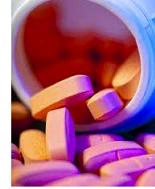J & J
Johnson & Johnson reaches agreement with U.S. on Risperdal criminal charge
 Johnson & Johnson said it reached an agreement to settle a misdemeanor criminal charge related to marketing of its antipsychotic drug Risperdal.
Johnson & Johnson said it reached an agreement to settle a misdemeanor criminal charge related to marketing of its antipsychotic drug Risperdal.
The U.S. has been investigating its Risperdal sales practices since 2004, including allegations the company marketed the drug for unapproved uses, J&J said in its quarterly filing yesterday. The Justice Department and the U.S. attorney in Philadelphia "are continuing to pursue both criminal and civil actions," the company said.
"Discussions have been ongoing in an effort to resolve criminal penalties under the Food Drug and Cosmetic Act related to the promotion of Risperdal," J&J said. "Certain issues remain open before a settlement can be finalized."
Carol Goodrich, a spokeswoman for New Brunswick, New Jersey-based J&J, declined to comment on how much the company set aside for the criminal case or when it might be resolved.
In May, company officials said in an SEC filing that they had reserved funds to resolve the government's claims over Risperdal marketing. J&J didn't say how much had been set aside. The drugmaker said in yesterday's filing it has added an unspecified amount to that reserve to cover criminal penalties.
The company also said it is in negotiations to settle civil investigations related to marketing of Risperdal and another drug, Invega. J&J said it wasn't sure an accord could be reached on those claims and it is unable to estimate a range of damages.
Meritorious defenses
J&J has "meritorious defenses to these claims, and it remains unclear whether a settlement can be reached as discovery is not complete, there are significant facts in dispute, the damages sought in the claims are unsubstantiated and indeterminate, there are numerous parties involved, and possible outcomes are uncertain," according to the filing.
Negotiations "may lead to a narrowing of the areas of disagreement and the liability may then become reasonably estimable," according to the filing.
The ultimate resolution of the criminal and civil matters "is not expected to have a material adverse effect on the company's financial position," J&J said in the filing.
J&J and the Janssen unit have been sued by 11 states seeking reimbursement for Medicaid or other public funds paid on Risperdal prescriptions, the company said. The lawsuits allege that J&J promoted the drug for dementia, mood and anxiety disorders and other unapproved uses, or downplayed risks.
Louisiana jury
Last year, jurors in Louisiana ordered the drugmaker to pay almost $258m to state officials for making misleading claims about the antipsychotic's safety. J&J has appealed.
In June, a South Carolina judge ordered J&J officials to pay $327m in penalties for deceptively marketing the medicine. J&J has asked the judge to throw that verdict out.
"The attorneys general of approximately 40 other states have indicated a potential interest in pursuing similar litigation against" the Janssen unit, J&J said. The statute of limitations on such actions has been put on hold while these states "pursue a coordinated civil investigation," J&J said.
The agreement in principle on the criminal charge is "pursuant to a single misdemeanor violation of the Food, Drug and Cosmetic Act," the company said.
In April, in a separate case, J&J agreed to pay $70m to resolve criminal and civil charges after admitting it bribed doctors in Europe and paid kickbacks in Iraq to win contracts and sell drugs and artificial joints. As part of a deferred prosecution agreement, J&J subsidiary DePuy was charged with conspiracy and violations of the Foreign Corrupt Practices Act.
In May 2010, J&J's Ortho-McNeil Pharmaceutical LLC pleaded guilty to a misdemeanor charge of selling a misbranded drug, admitting it illegally marketed its Topamax epilepsy drug. J&J paid $81m to resolve criminal and civil cases.
(Published by Bloomberg - August 10, 2011)